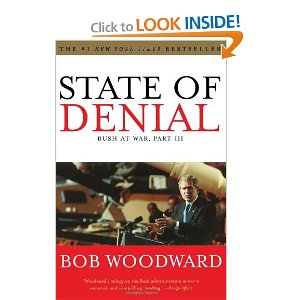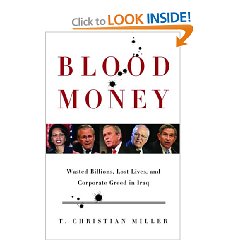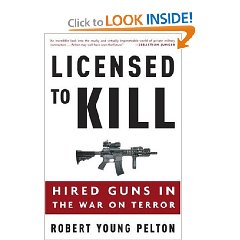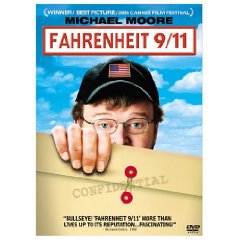I was the guy that did the threat study that put private military contractors on the official targeting list for the US Government, establishing them as legitimate targets who needed to be understood by all available (secret and open) means as either belligerents or at least relevant actors in any situation.
Robert Young Pelton, whom I know personally and admire as one of the most honest, courageous, and mature investigative journalists and adventurers (see my review of his Robert Young Pelton's The World's Most Dangerous Places: 5th Edition (Robert Young Pelton the World's Most Dangerous Places), is without question the best reporter and observer in the world of the “dogs of war.” He ranks up with and above Robert Kaplan, Seymour Hersh, and John Fialka, three intrepid and intellectual reporters who help define the extraordinary talents and veracity of this author, Robert Young Pelton.
When I received his book I dropped everything and offer here a few of the highlights:
He distinguishes carefully between Mercenaries (soldiers for hire) and Private Military Contractors (PMC) who are security for hire.
Blackwater, the best of the (PMC can train 35,000 men in a year, and delivers a lighter, faster, smaller (and more effective) security force than the U.S. Army.
He recounts the history of CIA money into Special Operations Forces (SOF) black operations, which in turn created PMCs. Just as CIA funded the jihad in Afghanistan, so also has it funded–perhaps ignorantly in both cases–the emergence of the PMCs.
Telling early story: before 9/11, lawyers reduced CIA and other action elements of the US Government to wimpy toast. It took 9/11 to frost the lawyers and unleash the real men in the USG and elsewhere.
EDIT: Prior to 9/11, the lawyers were piss-ants such as those who advised the ABLE DANGER team to destroy evidence discovered pre 9-11 of two hijackers, instead of turning it over to the FBI. CIA lawyers, with a couple of exceptions, are also piss-ants. Real men include the guys that went into Afghanistan (see my reviews of Jawbreaker: The Attack on Bin Laden and Al-Qaeda: A Personal Account by the CIA's Key Field Commander and First In: An Insider's Account of How the CIA Spearheaded the War on Terror in Afghanistan), and the guys at US Special Operations Command who are on their own all over the world. I never imagined that NSA and CIA would simply turn the lawyers off and violate ALL of our civil liberties, including warrantless wiretapping and rendition (kidnapping to export for torture) and the denial of habeas corpus to US and UK and Australian citizens, among others.
His overall account makes it clear that the new breed of PMC warrior is better in all respects (stronger, faster, smarter, better shot, more tech savvy) than the past SOF heroes, but FAILS in one important respect: tactical combat decision-making. He explains that communications has robbed the field men of all initiative, and they are now nothing more than risk takers for fat-assed pasty-faced Rear Echelon Mother Fryers (REMF) with too much rank, too much air conditioning, and not enough character to make it in the field.
This book will be, for some time, the basic reference for those who wish to be PMCs, manage PMCs, or employ PMC companies. On the one hand, he documents the rates and the profits ($500 a day per man, billed at $1500 a day per man, with $500 for overhead and $500 for profit PER DAY), but he also points out that at 24/7 ops tempo, this can come out to $25 an hour, or worse. He points out that SOF and other skilled uniformed professionals earn $50K a year, while PMCs can earn $200K a year–the contrast explains why SOF is hemorrhaging personnel. He discussed the 90 days on, 30 days off, but also notes that a third of the candidates do not make the grade in training, while half of those who are sent to the field do not make the grade under combat conditions and are Ordered Home.
In passing he notes that CIA tends to stink at local level relations, throwing money at locals to get intelligence, which is consequently generally bad and useless.
He also warns those who receive USG funded PMCs that as was the case in Haiti, the withdrawal of US funding for PMC security can be capricious and sudden.
He related the rise of the PMC to the political desire in the US of limiting the uniformed head counts in combat conditions, and this in turn not only supports PMCs with guns instead of uniformed military with guns, but also turning over all logistics to PMCs, some of which are unrealizable (and thus leave our troops without water and food and shower points in the clinch).
The book adds further to the documented view of Paul Bremer as a dictator no better than Saddam Hussein (who at least provided electricity and water and stability).
This thoughtful study notes that the Rules of Engagement (ROE) have not been well developed for PMCs, and that the seam between PMCs and the US military and the US Department of State are thoroughly screwed up to non-existent.
He notes that in addition to Iraqi disdain for Paul Bremer, there is acute Iraqi consciousness for the fact that in Iraq, PMCs are the top of the food chain and have everything, including jobs, which Iraqis have not received in the so-called “peace.”
This author and this book SMASHES both the Rolling Stone article on “Heavy Metal Mercenaries” and the self-promoting and largely false book The Hunt for Bin Laden: Task Force Dagger.
Passing comments document the different “tribes” in the PMC world, the fact that many PMCs are paying their US citizens with offshore accounts that evade taxes, that laptops not guns are the focus for many individuals (their lifeline to family and reality), that London is the center of gravity for PMC activity, that over 400 PMCs have been killed in Iraq (contract this with 2,500 from US military), and that the bottom line for PMCs is that they are largely ethical, moral, professional, and committed.
I especially liked the author's closing contrast between the British PMC model “it's about minimum force, Old Boy” and the US model, “high tech max force” approach.
Immortal quote on page 227: “The post 9/11 world opened up a Pandora's box of prospects for adventurers, conmen, and opportunists….”
I will end with three points the author brings out:
1) PMC Blackwater is smart, focused on the bomb makers not the bomb deliverers.
2) Everybody is making money in Iraq (that is a US citizen) EXCEPT the US uniformed soldiers actually fighting the war.
3) PMCs are, like guns, something that can be used for good or bad.
Robert Young Pelton is extraordinary, and this book is the cutting edge of reality: PMCs. He is unique for his preparation and for walking in the PMC shoes.











